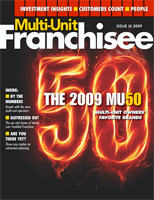Overcoming Performance Anxiety: Re-Defining Success for Your Investment Portfolio
I know few people who had money-making investments in 2008. On the flip side, I know many whose portfolios technically beat their respective benchmarks.
In a rising market (like that experienced in 1999), beating the benchmark would have been considered a badge of honor--providing ample bragging rights on the golf course and around the dinner table. However, having relatively "less loss" in a down market isn't exactly considered a wonderful experience for most of today's investors.
Why doesn't it feel so wonderful? The answer lies in the prevailing view of what constitutes performance success. While losing 5, 10, or even 25 percent when the market was down 39 percent could be viewed as strong relative performance, the absolute losses--as we've all learned--cause overriding pain. In the most severe cases, they don't just cause a little angst. Losses are significant enough to prompt lifestyle changes, including delayed retirement and restrained spending.
For centuries, people didn't really engage in performance measurement as it related to investments. They were primarily concerned with whether their economic activities met basic requirements, like putting food on the table, building a business to leave to the kids, or investing in the securities of companies with long-term viability. Discerning how a given period's percentage change across a subset of assets stacked up relative to an arbitrary index--or against the guy down the street--just didn't make sense.
Statistical performance measurement really took off in the past few decades. Computers made calculations more routine, and professional money managers absorbed a larger share of the management pie. In our increasingly time-pressed world, we've become obsessed with performance measurement as a way to (theoretically) compare managers--despite the fact there's still no mandated way to uniformly calculate or report performance across manager styles (i.e., a CPA can do it differently than a registered investment advisor or a mutual fund.) This pernicious reviewing of past performance as a method for selecting managers has always struck me as shortsighted. Numerous studies have shown that what performed well in the recent past is almost always at the bottom of the heap in the upcoming period.
As we've already established, even if you outperformed on a relative basis, last year's portfolio results probably didn't make you happy. Yet if the days of statistical calculation are outmoded, what can we use? How do we measure investment success, rather than allowing a simple percentage change to measure whether or not our portfolio stacks up? Because the answers to these questions are lengthy, we'll address them over two columns.
Before we can measure performance success, we must first define it. Does successful performance for you mean picking a fund that outperforms your brother-in-law's investments? Or does it mean having enough money in cash and fixed investments to accommodate regular spending for 12 to 24 months should an unforeseen personal or global event arise? When considering all of your financial attributes (i.e., both your balance sheet and cash flow sources), what will it take to help you sleep at night? When you are gone, what financial wherewithal do you want to leave those people and institutions you care about? This defining process typically brings the performance discussion back full circle to the type of discussions held before the computer era.
Most families have their assets and debts stashed in numerous vehicles, accounts, and even boxes. Pulling the data together can be an overwhelming task. In addition, figuring out how the pieces do or don't work together can often become a multi-dimensional issue (e.g., Are you maxing out a 401(k) contribution while simultaneously carrying high-interest credit card debt?). Not to mention what it may cost to maintain specific assets: fees on accounts; property taxes, insurance, and maintenance costs on hard assets; and the all-in cost of transaction, tax and accounting fees in a high-turnover brokerage account. It often seems easier to rely on performance calculations rather than to wrap our heads around the complicated chaos of our financial situation.
That said, making more strategic decisions regarding your performance success formula (including how it should look now, in 3 years or even in 30 years) requires a solid grasp of what you own, generate, and spend. Over the next few months, take some time to pull that information together. Jot down what you hope to accomplish or do differently. With this information in hand, you may gain a less pain-provoking perspective as we explore a wider definition of true investment outperformance in upcoming columns.
Carol M. Clark, CFA, is a partner and investment principal of Lowry Hill, a private asset management firm that provides proprietary investment management and financial services to families, individuals, and foundations with wealth greater than $10 million. The firm manages approximately $6 billion in assets for nearly 300 families and more than 60 foundations from offices in Chicago, Minneapolis, Naples, and Scottsdale. She welcomes questions and comments at cclark@lowryhill.com.
Share this Feature
Recommended Reading:
Comments:
comments powered by DisqusFRANCHISE TOPICS
- Multi-Unit Franchising
- Get Started in Franchising
- Growth
- Operations
- Open New Units
- Leadership
- Marketing
- Technology
- Legal
- Awards
- Rankings
- Trends
- Featured Franchise Stories
FEATURED IN

Multi-Unit Franchisee Magazine: Issue 3, 2009
$150,000




 The multi-unit franchise opportunities listed above are not related to or endorsed by Multi-Unit Franchisee or Franchise Update Media Group. We are not engaged in, supporting, or endorsing any specific franchise, business opportunity, company or individual. No statement in this site is to be construed as a recommendation. We encourage prospective franchise buyers to perform extensive due diligence when considering a franchise opportunity.
The multi-unit franchise opportunities listed above are not related to or endorsed by Multi-Unit Franchisee or Franchise Update Media Group. We are not engaged in, supporting, or endorsing any specific franchise, business opportunity, company or individual. No statement in this site is to be construed as a recommendation. We encourage prospective franchise buyers to perform extensive due diligence when considering a franchise opportunity.